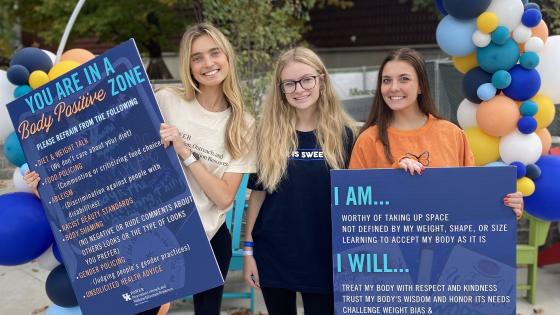
Intuitive Eating and Body Image
At POWER, we utilize an evidence-based weight-inclusive philosophy. Therefore, we do not provide weight loss counseling. We embrace well-being independent of weight through a non-diet, Health at Every Size, and an Intuitive Eating approach. We focus on establishing life-long behaviors, recognizing that weight is not a behavior. We help students develop a positive relationship with food by incorporating balance and variety without rigid rules or restrictions.
For presentations or further information about Intuitive Eating and Body Image programming, email Meghan Wolf
For additional information or to request a customized program or service, email POWER
Follow us on Instagram: @poweruky
2nd Floor Gatton Student Center East Wing
Office Hours: 8:00 a.m. – 4:30 p.m.
Hilary J. Boone Center
Office Hours: 8:30 a.m. – 5 p.m.
Intuitive Eating and Body Image
What is Intuitive Eating?
Intuitive Eating is a self-care eating framework that focuses on listening to your body's signals rather than external diets or food rules. Instead of following strict meal plans or calorie counting, it encourages individuals to honor their hunger, respect fullness, and enjoy the pleasure of eating. This approach promotes a healthy relationship with food by emphasizing satisfaction, body acceptance, and mindfulness. By tuning into internal cues like hunger, fullness, and satisfaction, individuals can cultivate a more balanced and sustainable approach to nourishing their bodies without guilt or restriction.
Intuitive Eating Focuses on 10 Principles:
- Reject the Diet Mentality
- Honor Your Hunger
- Make Peace with Food
- Challenge the Food Police
- Discover the Satisfaction Factor
- Feel Your Fullness
- Cope with Your Emotions with Kindness
- Respect Your Body
- Movement - Feel the Difference
- Honor Your Health with Gentle Nutrition
Whether you're looking to break free from diet culture, find balance, or simply connect with like-minded peers, an Intuitive Eating Group may be for you! Join POWER and the UK Counseling Center for a 4-week intro series into Intuitive Eating.
What is Body Image?
Body Image refers to an individual's perception, thoughts, feelings, and beliefs about their own body appearance and shape. It encompasses how one sees themself when they look in the mirror, as well as how they feel about their body's size, weight, and features. Body image can be influenced by societal standards, media portrayals, personal experiences, and cultural norms. A positive body image involves accepting and appreciating one's unique physical attributes, while a negative body image may involve dissatisfaction or disapproval of one's appearance. Cultivating a healthy body image involves recognizing and challenging unrealistic ideals, focusing on self-acceptance and self-care.
Interested in getting involved? Join POWER in celebrating Body EmPOWERment Week each fall and Eating Disorder Awareness Week each spring.